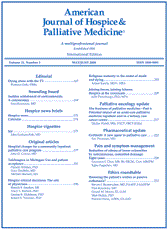Publications
American Journal of Hospice &
Palliative Medicine
Abstracts
Subscription information
Advertising information
Editorial
review board
Current table of contents
Order
reprints
Manuscript submission
American Journal of Alzheimer's Disease & Other Dementias
Activities Directors' Quarterly for Alzheimer's & Other Dementia Patients
American Journal of Recreation Therapy
Melatonin slows cancer but is little used
Weston, MA, July 27, 2005--Despite growing evidence that melatonin significantly improves risk, survival, and performance status in patients with advanced cancer, it continues to be overlooked as a therapeutic option because it lacks US Food and Drug Administration (FDA) approval and requires administration at times of day inconvenient to physicians.
Fade Mahmoud, MD, of the University of South Dakota at Sioux Falls, and colleagues conducted a review of the literature from 1990 to 2004 to assess the benefits of melatonin, a hormone secreted by the pineal gland, as supported by clinical research. Their findings appear in the July/August 2005 issue of American Journal of Hospice & Palliative Medicine.
Mahmoud's team found strong evidence supporting melatonin's role as an antitumor agent. Melatonin is a chronobiotic; that is, it has the ability to set and reset the body's circadian clock. Cancer cell proliferation peaks at certain points in a 24-hour period. As a chemical regulator of the circadian clock, melatonin slows cancer growth if administered when cell proliferation is expected to be high.
Despite the evidence, few physicians incorporate chronotherapy in their clinical practice. Anticancer therapies continue to be scheduled according to physician convenience rather than for maximum efficacy. In addition, because the hormone is not yet regulated by the FDA, the debate regarding the purity, safety, and efficacy of over-the-counter melatonin continues.
The authors conclude that regulated melatonin is an effective treatment for advanced cancer and call for further research to determine optimal dose and administration time to maximize its clinical effects.
To order the complete article, visit the Journal's Web site at www.hospicejournal.com. For additional information, contact the publisher at American Journal of Hospice & Palliative Medicine, 470 Boston Post Road, Weston, MA 02493, Tel. 781-899-2702 x142.
# # #
| Subscription information | Advertising information | Editorial review board | Current table of contents | Order reprints | Manuscript submission |
| Abstracts | Cumulative indices | ||||
Copyright (c)2005 Prime National Publishing
Corp. - ALL RIGHTS RESERVED
Web author: Deborah Rines
Last update:
07/28/2005
